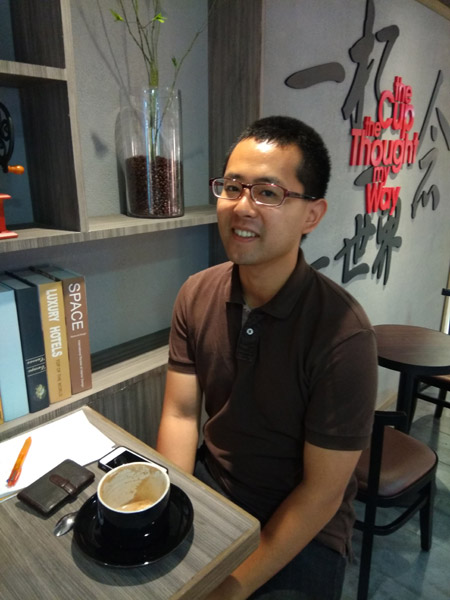Japanese journalist focuses on wartime atrocities of Japan
Takuya Kobayashi, Beijing bureau chief of the Japanese Communist Party's official newspaper Shimbun Akahata, has paid several visits to the same Chinese county to report on a slaughter more than 70 years ago by the Japanese imperial army.
"I have been to Nan county in Hunan province," he said. "This act of Japanese aggression is little known even to the Chinese in other parts of the country and more than 30,000 people were slaughtered," Kobayashi told China Daily.
His party has consistently said that Japan should own up to its wartime aggression and admit to the atrocities it committed, and the party has also strongly objected to revisionism in Japan to better understand what Japan did.
Kobayashi has spent great deal of time visiting places and people who witnessing the events.
When he went to Jiaochang Township in the county in May last year for interviews, he even paid a pilgrimage to the cemetery where some of the victims were buried.
Earlier this year, his party's central committee compiled a book on Japan's aggression and colonialism, and his report on the slaughter runs for seven pages, featuring detailed quotes, a picture and a map.
|
 Kobayashi has travelled to most provinces and autonomous regions in China for a deeper understanding of the country.Zhang Yunbi / For China Daily |
The stunning details of the slaughter include a scene where a Japanese soldier ripped open the belly of a pregnant woman, took the infant out and bayoneted it.
"We need to face squarely up to Japan's history of aggression, expose more people in Japan to that part of our history and get them to know more," he said.
When asked about the understanding and depth of knowledge among the younger generation in Japan, Kobayashi sighed: "The leading Japanese media outlets rarely report on such themes".
After he arrived in China in June, 2012, as Beijing bureau chief, Kobayashi travelled to most provinces and autonomous regions in China for a deeper understanding of the country.
"I have not yet travelled to the Tibet autonomous region, Qinghai, Guizhou or Guangdong provinces," he said.
The 35-year-old writer has observed some of China's growing pains, that Japan shares, like an aging population and wealth disparity.
"China has a huge population, but it is faced with both a dropping birthrate and an aging population. It is actually aging for becoming a more developed economy," he said.
Many Chinese have said Japan has set a good example in some areas to follow but, Kobayashi does not agree. "The national conditions are different, so are their populations ... Japan also has some weak links, such as social security, medical security and pensions."
He added that China should shape a system that "enjoys Chinese characteristics and brings the greatest happiness to the people".
He has a wide brief in China and has found his own way to collect information through cyberspace and social networks.
"I often have a look at Sina.com," he said of the leading Internet portal.
Like many Chinese, he uses of WeChat, now the most popular instant messaging app in China, and he said he could learn a lot by browsing the postings of his friends in "Moments", a Wechat function similar to the homepage of a Facebook account.
"Before coming to China, I thought there was no freedom of expression in the country ... but by being here, I have seen people expressing their views freely and they can chat easily," he said of his cyberspace experience in China.
As a member of the Japanese Communist Party, Kobayashi found many Chinese scholars he talked with are members of the Communist Party of China.
"They are friendly to me and call me 'comrade'," he said.
Kobayashi seems to have a good understanding of the Chinese party.
"There are quite a lot of negative reports about the CPC by foreign media. But it now has more than 80 million members, and those reports are about just some of the members," he said. "Many members are still fulfilling the Party's purpose of serving the people. They have great faith. In this respect, I admire the CPC members."
As for the ordinary Chinese, Kobayashi said they always seem to be in a hurry.
"It seems that everybody is in a rush to catch up a subway," he said of Beijing's metro system.
Noting that China has become the second-largest economy in the world, Kobayashi observed that people's livelihoods are improving and the Party and the government should continue "listening to the ideas of the public".
But China is also faced with the negative factors, such as corruption and pollution, he said. "Witnessing the heavy air pollution in January, 2013, I felt the negative byproduct of China's development."
"And I observed the efforts by the Chinese government to protect the environment. Well, the work is okay," he smiled, adding that countries such as Japan and the United States share the same problem.
Contact the reporter at zhangyunbi@chinadaily.com.cn
























